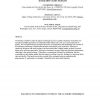Free Online Productivity Tools
i2Speak
i2Symbol
i2OCR
iTex2Img
iWeb2Print
iWeb2Shot
i2Type
iPdf2Split
iPdf2Merge
i2Bopomofo
i2Arabic
i2Style
i2Image
i2PDF
iLatex2Rtf
Sci2ools
EOR
2011
2011
The effects of sensitization and habituation in durable goods markets
: We develop a model to study the impact of changes in price or quality sensitivity on the firm as it introduces multiple generations of a durable product where unit costs are a convex function of quality. We incorporate the psychological processes of sensitization and habituation into a model of discretionary purchasing of replacement products motivated by past experience. When price sensitivity decreases with each purchase, the firm should offer a higher quality product at a much higher price with each generation. When price sensitivity increases with each purchase (habituation), skimming is the optimal strategy. When there is sensitization followed by habituation, the firm eventually provides higher quality than the market is willing to pay for, leading to a steep drop-off in sales and profits. This analysis provides a model of the consumer behavior underlying the phenomenon of “performance oversupply” identified in the innovation literature. PLEASE DO NOT DISTRIBUTE WITHOUT THE...
EOR 2011 | Habituation | Model | Price Sensitivity |
| Added | 14 May 2011 |
| Updated | 14 May 2011 |
| Type | Journal |
| Year | 2011 |
| Where | EOR |
| Authors | Guilherme Liberali, Thomas S. Gruca, Walter M. Nique |
Comments (0)

